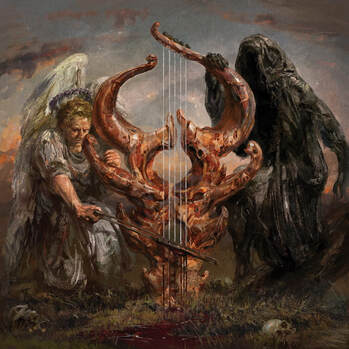 Written by: Continuous Thunder Over the course of 20 years and 10 studio albums, Demon Hunter have established a tradition of including at least one lighter or slower song on each release. Now, you might imagine that these wouldn’t be the most popular songs in their catalog. Nobody listens to an alternative metal album excited to hear the ballads, right? While that is the case with a handful of these tracks, some of them became fan favorites and even managed to get on some Christian music charts. Partially because of the lack of harsh vocals, but also because Demon Hunter has a knack for writing slow songs that don’t suck, and likely because they choose to go for more melancholic themes rather than sappy ones. For their 11th release, the band has re-recorded many of these slower songs from their catalog with acoustic and orchestral arrangements, further emphasizing their gloomy tones. The obvious benefit to an album like this is that some of the ballads from Demon Hunter’s past could honestly use some rearrangement. The album’s opener, “My Throat is an Open Grave,” comes from their self-titled debut and benefits greatly from nearly 20 years of maturity and the fine aging of Ryan Clark’s voice (which is one of the best in alternative metal, in my humble opinion). Similarly, “The Tide Began to Rise” from 2005’s The Triptych, being one of the band’s weakest songs with bizarre production choices and obvious keyboard strings, but now feels like the song it was always meant to be with much better instrumentation and production. Beyond that, most of the songs here feel like pretty equal substitutes for the originals. A good early example is the re-recording of “Dead Flowers” from 2012’s True Defiance, a fan favorite. In this version, the band makes effective choices in the orchestration to recreate the emotional weight of the original, as well as adding female vocals. The bagpipes at the end are a nice touch too. That said, I can’t really say if I like one version better than the other. The results are very similar for other tracks like “Blood in the Tears,” “Loneliness,” and “I Will Fail You.” They’re not bad, but they don’t really add or subtract from the originals, either. Then there are the tracks where the re-imaginings don’t work out so well. “Deteriorate,” originally a song with a wonderfully atmospheric feel and a chorus that delivers a powerful emotional punch has its instrumental reduced to just a piano for the majority of the song. They try to recreate some of the impact with drums and acoustic guitars at the end, but it doesn’t measure up. “Carry Me Down,” a song that has drawn its fair share of manly tears, has its emotional weight drastically reduced. I guess I can see why this version would need to exist if you wanted to use it at a funeral like what’s mentioned in the song, but the punch just isn’t there. Perhaps the worst offender is “My Heartstrings Come Undone,” another fan favorite with an iconic intro. The new version reduces the arrangement to a string quartet that doesn’t exactly sound pretty and again, the emotional weight is pretty much gone. Finally, there are some decisions that are more confusing than anything. The album features an all-new song called “Praise the Void,” and it’s just kind of there. I mean, it’s pretty, but the whole point of the album is to re-imagine old songs in a new style. By presenting a new song in this style, it’s difficult to get excited about because it’s not representative of what the band normally does. And it doesn’t help that it’s not very memorable in the first place. Then there’s “I Am a Stone,” which was originally only available as a bonus track on the deluxe edition of True Defiance, and already fits the style of Songs of Death and Resurrection as its instrumental is just a string quartet. However, the version present on this album is re-imagined with drums and acoustic guitars. So they changed it by making it less like all the other reworked tracks. That makes sense! Another interesting note is that not all of their studio albums are represented on this album despite having more than enough tracks to cover them. Missing albums are Outlive from 2017, an album I even forgot existed until I did the research for this review, and War from 2019. However, War was released simultaneously with Peace, which is represented by the track “Loneliness,” so I guess it technically still counts. Listening to Songs of Death and Resurrection, you realize that’s not just a gloomy title for the sake of being gloomy. These guys write about death a lot. By re-imagining these songs with acoustic and orchestral arrangements, they lean into their melancholic themes and even push them towards doom territory. While the album is decent by acoustic album standards, it’s ultimately only okay for me. Most of the songs are on par with their original versions, and the few tracks that do improve on the originals are canceled out by the ones that are worse. It’s a fine effort, but it will likely only appeal to people who are already fans of Demon Hunter. Demon Hunter - Songs of Death and Resurrection was released March 5, 2021 via Solid State Records Continuous Thunder reviews even more music both inside and outside the realm of metal on his own blog, conveniently entitled Continuous Thunder. Now that you're done reading this, you should head over there and check it out!
0 Comments
Leave a Reply. |
Welcome!
We provide thoughtful reviews of music that is heavy, gloomy...and loud enough to wake us from slumber. Written by a highfalutin peasantry!
|
 RSS Feed
RSS Feed